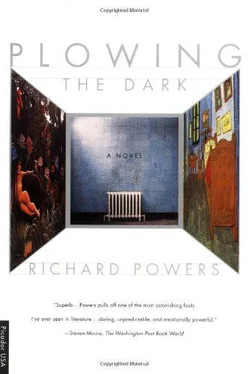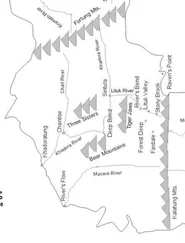And yet, in the fogged celluloid of this focused dream, the story repeats. The home you both set fire to, again and again. The constant border incursions, the mutual banishment. It's never enough for you. You're never satisfied. You want my fucking bone marrow.
She didn't know you when there was a now. How could she know you in absentia? And the need you felt for her — the love— must become a crippling thing, so filled with self-inflicted misery that even redemption now would ring worse than hollow.
Perhaps, your only reading matter says, perhaps God will place love between you and those that you are hostile toward. For God is powerful. And God is forgiving. And God is compassionate.
The mouse comes out to gnaw on the pages of the book. On those words, for those who can believe without seeing. You let it nibble. Let the creature take from you everything it needs.
As belated thanks for helping them with the video, the keepers return your necklace. Gwen's good-luck charm, the one they confiscated from you on the first day of imprisonment. You sit gripping it, unable to quit sobbing. You press the sharp point of the charm into your cheek, trying to get your thoughts to stop. Guards come and wrestle you, pin you to the ground, and confiscate the charm again.
"Please. I am sorry. Please give it back. I won't hurt myself anymore." A good deal later, after the gouge in your face has more or less healed, a hooded man comes in to snap your picture. Three days on, Ali brings you the print and tells you to sign your name across it.
It's some kind of bush-league trick. An amateur hoax you can't quite puzzle out. They force you to affix your signature to another man's picture, another Crusoe who only vaguely resembles you, gaunt and wasted from sockets to jowls, mizzled gray throughout the hair and beard, a fake-up that will fool no one. Ali harasses you into signing before you can figure out who exactly you're perjuring.
Maybe another month goes by. You almost forget about having taken part in the bizarre ritual. Ali bursts into your cell one day, aflame.
"See who is famous today? See who is in today's newspaper? American film star! Mel Gibson!"
"Gibson is Australian," you say. "Not our fault."
He waves a scrap of newsprint under your blindfold. Eternity's long-sought armistice. Page 6 of the Herald Tribune, and there is the old man's photo, identified as you. Someone has been duped, either you or the world at large. And you don't care anymore, just who.
"Please," you beg. "Let me just… hold it. For sixty seconds." Not to read the article about you. Just for the look, the longitudinal proof of things happening. The feel of it in your hands: your old breakfast table news.
He won't let you hold it, if only because you want to. But before he snatches it away from you forever, you catch a glimpse of the date. You take the number to bed with you, vowing on your life never to lose count again. You shelter the secret figure in your heart, protecting it from all human invention. You perform vast calculations on it, sums and differences, expansions and extractions.
The math's stubborn result rocks you. Simple subtraction slams you up against a figure too mythic for you to believe. You go head-to-head, putting it through the calendar's mill so many times your brain begins to bleed. And still it persists, staring at you in its perfection.
If you were in fact taken on that November day of '86 that has stayed lodged in you, and if the scrap of paper they waved at you was in fact today's, then tonight is precisely your thousandth night. And tomorrow will be your thousandth night, plus one.
The thing accreted like any cathedral, one stone on the other. Each wall's blocks were but ghosts, floating in array through a million dynamically refreshed video addresses a second. And yet, to the ones who hewed and hick-pointed them, they passed for stones.
The designers fit their fly-through together in gross modules: first the ground floor, along with the narthex and exonarthex at the west entrance. Then, above the blending of aisle and apse, they placed the gallery. On top of that, they set spans of triforium arch to support the stunning trick of clerestory.
They worked for a month on the elevation alone. They studied the architectural analyses, the conjectures about what held the thing up. No two experts agreed, except in their astonishment. True to history, the group needed several tries to get the dome to stay in place. The window-ringed weight defied them. After the second time that it collapsed and crashed to the floor, Spiegel took to repeating, Oh, the humanity1. But out of repeated disasters, radiance took shape.
That looming nave terrified Adie's dog. Pinkham had gotten used to the Arlesian Room, curling up in an empty corner, at most barking at the squeak of a floorboard. But those long, shrouded sight lines undid the creature. Something about the size of the undulating space, the smoke-colored arcades opening onto farther distances, spooked him. He would
not set paw in it.
Vulgamott played module librarian, putting his finger on each new part and tweaking the object's properties as needed. Ebesen fussed over every spandrel and inset. This man, who had not cleaned his mobile home since purchase, insisted that every filigree and tracing be perfect. Their modular objects lay wrapped inside a larger code, bits as opportunistic as those pagan Venus-temple columns incorporated into Notre
Dame.
Six weeks along, the mosaic team began to fuse. Their private differences got lost in the size of the undertaking. Lim and Jackdaw combined forces to solve the scale problem, getting the Cavern to house a grotto orders of magnitude larger than itself. Rajasundaran took on the challenge of that cavernous reverberation. Loque sculpted the shafts of changing light, those eerie threads spun out of the master source.
Adie took charge of the mosaic saints. Spiegel delighted daily in watching her assemble the stones. As she turned high-resolution photographic reproductions back into low-res squares of colored tile, the staircased edges of her own soul smeared and softened.
This must have been why you brought me out here, Stevie. Without even knowing it. I mean, I don't want to sound mystical or anything…
Why not? Go wild. Christ Pantocrator will roll with it.
It's just that… I'd forgotten what it feels like to be part of something bigger than I am. To have some work that I'm…
Destined to do? he asked. But the old irony hid itself under a bushel.
She shrugged. Every person has something she's supposed to do. I knew this when I was little, but I forgot. It comes back to you, though. That's the beauty: you think you're lost. You stumble around forever without knowing which way is forward. But you tum a comer one day and your work is right there, smack in front of you. Tracking you like the moon.
But you knew that, back when I met you. You already had your work.
She squeezed her eyes shut. Knew. Met. You knew me when I was an ecstatic novice. When I first went to SoHo, all I could talk about was line and energy and light. Before I knew it, I was chatting away about bankability and impact and positive portfolio exposure. It's horrible. You can't imagine what an industry, what a…
Factory?
She snorted. You see? That's where we live.
But Rubens was a factory. Ingres was an industry.
The Master of Flémalle wasn't.
Sure he was. The Church paid for those Annunciation panels by the metric ton.
Vermeer wasn't.
Lackey of the rising propertied class. Gimme a foot and a half of something in burnt umber that'll look good above the dining-room sideboard.
Читать дальше












